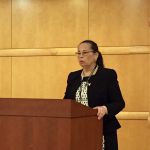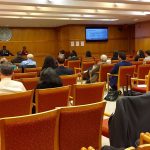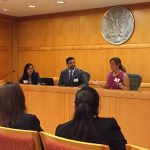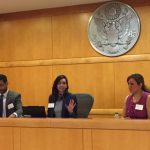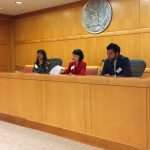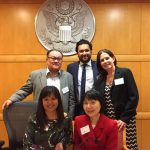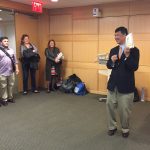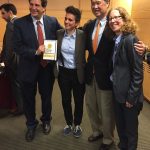News Release
For Immediate Release
April 21, 2017
For More Information, Contact:
Brett Schuster, Communications Manager
bschuster@napaba.org, 202-775-9555
WASHINGTON — The
National Asian Pacific American Bar Association (NAPABA) led 43 of its
national associate and affiliate bar associations in filing an amicus brief
in the U.S. Court of Appeals for the Ninth Circuit to support the
preliminary injunction of President Trump’s March 6, 2017, revised
executive order barring refugees and individuals from six
Muslim-majority countries from entering the United States.
The Trump Administration’s appeal in this case, State of Hawaii v. Trump, arises from the first legal challenge to the revised executive order, which was
brought on March 7, 2017, on behalf of the State and Ismail Elshikh,
Imam of the Muslim Association of Hawaii. NAPABA filed an amicus brief
on March 12 supporting the plaintiffs’ request for a temporary restraining order. On March 15,
Judge Derrick K. Watson of the U.S. District Court for the District of
Hawaii granted the temporary restraining order, which he converted into a
preliminary injunction on March 29
to extend the block on the travel and refugee restrictions. The U.S.
district court in Maryland has also enjoined the six-country visa ban,
and the Administration’s appeal in that case is pending in the Fourth
Circuit, where NAPABA filed an amicus brief on April 19.
“Having
challenged the revised executive order from this initial lawsuit,
NAPABA is proud of the growing momentum across our national network as
we continue our advocacy in the courts,” said NAPABA President Cyndie M.
Chang. “As leaders in the legal profession and as Asian Pacific
Americans whose communities have experienced the harms of exclusionary
laws, NAPABA has an imperative to stand against this unlawful
anti-Muslim and anti-immigrant order.”
NAPABA’s
amicus brief describes decades of statutory exclusion of citizens of
Asian and Pacific Island countries under early U.S. immigration law,
including the Chinese Exclusion Act of 1882 — the first federal law to
ban a group of people on the basis of their race. The Civil Rights Era
marked a dramatic turning point that saw Congress dismantle
nationality-based discrimination with the Immigration and Nationality
Act of 1965. The brief explains that presidential discretion in the area
of immigration and refugee admission, while broad, is limited by
statute. NAPABA argues that President Trump’s revised order, with its
anti-Muslim underpinnings, violates the unambiguous prohibition on
discrimination established by Congress.
NAPABA recognizes lead pro bono counsel, James W. Kim, a NAPABA member and partner at McDermott
Will & Emery LLP, in Washington, D.C., Mr. Kim’s team (including
Andrew Genz, Philip Levine, Joshua Rogaczewski, Matthew Girgenti, and
Michael Stanek), and NAPABA Amicus Committee co-chairs, Professor Radha
Pathak of Whittier Law School and Albert Giang, a partner at Boies,
Schiller & Flexner LLP in Los Angeles, for their leadership drafting
the brief, which also involved the efforts of NAPABA staffers.
The Ninth Circuit will hear the case on May 15, 2017, in Seattle.
NAPABA’s brief was endorsed by:
- Arizona Asian American Bar Association
- Asian American Bar Association of the Greater Bay Area
- Asian American Bar Association of Greater Chicago
- Asian American Bar Association of New York
- Asian American Bar Association of Ohio
- Asian American Criminal Trial Lawyers Association
- Asian American Lawyers Association of Massachusetts
- Asian Bar Association of Washington
- Asian Pacific American Bar Association of Central Ohio
- Asian Pacific American Bar Association of Los Angeles County
- Asian Pacific American Bar Association of Pennsylvania
- Asian Pacific American Bar Association of Silicon Valley
- Asian Pacific American Bar Association of South Florida
- Asian Pacific American Bar Association of Tampa Bay
- Asian Pacific American Bar Association of Virginia
- Asian Pacific American Lawyers Association of New Jersey
- Asian Pacific American Women Lawyers Alliance
- Asian/Pacific Bar Association of Sacramento
- Austin Asian American Bar Association
- Chinese American Bar Association of Greater Chicago
- Connecticut Asian Pacific American Bar Association
- Filipino American Lawyers Association of Chicago
- Filipino American Lawyers of San Diego
- Filipino Bar Association of Northern California
- Japanese American Bar Association
- Korean American Bar Association of Chicago
- Korean American Bar Association of Northern California
- Korean American Bar Association of Southern California
- Korean-American Bar Association for the Washington, DC Area
- Korean American Lawyers Association of Greater New York
- Michigan Asian Pacific American Bar Association
- Minnesota Asian Pacific American Bar Association
- Missouri Asian American Bar Association
- National Asian Pacific American Bar Association – Hawaii Chapter
- National Filipino American Lawyers Association
- Orange County Asian American Bar Association
- South Asian Bar Association of Chicago
- South Asian Bar Association of Northern California
- South Asian Bar Association of Southern California
- South Asian Bar Association of Washington
- Southern California Chinese Lawyers Association
- Tennessee Asian Pacific American Bar Association
- Thai American Bar Association
—-
Read the amicus brief here.
Read NAPABA’s amicus brief in the district court in State of Hawai‘i v. Trump.
Read NAPABA’s amicus brief the parallel Fourth Circuit case, International Refugee Assistance Project v. Trump.
Read the March 6, 2017, statement of NAPABA and the South Asian Bar Association – North America, joined by 14 affiliates, against the revised executive order.
For more information, the media may contact Brett Schuster, NAPABA communications manager, at 202-775-9555 or bschuster@napaba.org.
The
National Asian Pacific American Bar Association (NAPABA) is the
national association of Asian Pacific American attorneys, judges, law
professors, and law students. NAPABA represents the interests of almost
50,000 attorneys and approximately 75 national, state, and local Asian
Pacific American bar associations. Its members include solo
practitioners, large firm lawyers, corporate counsel, legal services and
non-profit attorneys, and lawyers serving at all levels of government.
NAPABA
continues to be a leader in addressing civil rights issues confronting
Asian Pacific American communities. Through its national network of
committees and affiliates, NAPABA provides a strong voice for increased
diversity of the federal and state judiciaries, advocates for equal
opportunity in the workplace, works to eliminate hate crimes and
anti-immigrant sentiment, and promotes the professional development of
people of color in the legal profession.
To learn more about NAPABA, visit www.napaba.org, like us on Facebook, and follow us on Twitter (@NAPABA).
National Asian Pacific American Bar Association | 1612 K St. NW, Suite 510 | Washington, D.C. 20006 | www.napaba.org


